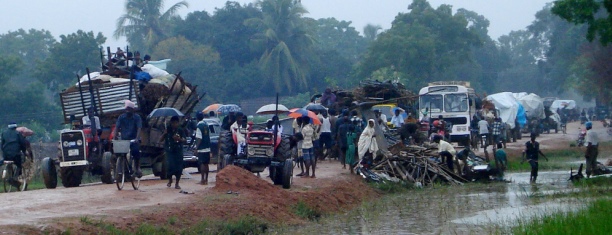( Tamil IDPs on the move, 2009 April)
(English translation of a interview with Suren Surendiran, published in Divaina)
Q: Is there a deadline for setting up of war crimes court?
Yes, there is as far as I know. Hon Foreign Minister Mangala Samaraweera announced in September at the UN Human Rights Council that he will consult all stakeholders on setting up of the accountability mechanism by end of February 16. The resolution co-sponsored by Sri Lanka also calls upon the Government of Sri Lanka to give the Council a verbal report on progress at the June 16 session.
Q:Will you (GTF) appear before it?
GTF will fully co-operate with the UNHRC resolution. However, it is the victims and their statements along with the witnesses including the various military, government and other civil service personnel, remaining LTTE members, photographic, video and other evidences that will be key to be examined by this special court. Remember over 290,000 people came out of the war zone at the end of the fight. Most are still living. All of them were direct witnesses.
Crimes committed post end of war in May 2009, has even more victims and witnesses.
Q:Do you (GTF as well as other org which represent the interests of Tamil people living in SL and overseas) want 100 per cent implementation of Geneva resolution approved on Sept. 30?
Beyond whether the GTF and other organisations want full implementation of the resolution, it is Government of Sri Lanka’s responsibility and by co-sponsoring the resolution, it’s her commitment to the UN and wider international community, to implement the resolution in full. It is humanity’s obligation to the tens of thousands of victims to ensure justice is served, after all which is what the resolution is trying to achieve.
Remember there are victims of crime from all communities in Sri Lanka, including the military who had thousands disappeared during the war.
Q: What GTF’s relationship with the TNA?
We are two separate entities. GTF has a friendly, healthy and cordial working relationship with the TNA which includes the elected representatives of our people in Sri Lanka.
Q: TNA refused to field ex-LTTE cadres on its Aug. 17 parliamentary polls nomination lists. Did TNA consult GTF before the decision was made?
Of course, not! Like I said in my earlier answer, TNA and GTF are two separate entities. We have separate decision making bodies.
Q: Paranagama Commission proposed international technical assistance and observer status for countries, thereby ruled out international judges, including Commonwealth judges. What is your position?
GTF fully supports the resolution passed by the UNHRC in September 2015, which incidentally was also co-sponsored by the Government of Sri Lanka. The resolution calls for international judges, prosecutors, lawyers and other international specialists to be included in the accountability mechanism.
Q:Former President CBK recently declared that the proposed war crimes probe would focus on the top chain of command of SL military. She asserted that those who ordered atrocities should be held accountable instead targeting those carried out orders. Please comment on CBK’s statement.
I believe that is a widely shared notion.
Q: Can you compare Sierra Leone war crime probe and the proposed investigation in SL.
I am not a war crimes expert, however from what I know I realise that in Sri Lanka during and after the war many and various crimes were committed by both sides breaching numerous local and international laws.
Q:Finally, who backed GTF’s struggle which led to the Sept 30 Geneva resolution and the role played by foreign and local media.
GTF is an umbrella body representing various country organisations. To create awareness of the plight of Tamil people in Sri Lanka and to resolve their issues we proactively engage international and local media, other governments from countries where a large number of Tamil people live, international human rights and other organisations.
Q: Did you receive local (Sri Lanka) media coverage and backing to propagate your stand before Jan 8 revolution?
Yes, we did but it was strictly limited to a very few English print media including The Island. There was never a possibility of GTF being interviewed in the State media outlets like The Daily News or the Rupavahini. There were never any opportunity given to us by any Sinhala media outlets be it print, voice and visual. Any coverage of GTF or any Tamil Diaspora news on these state media were either false propaganda or at best manipulated heavily to portray a negative image of GTF.
However, since 8 January 2015, the space for freedom of expression in Sri Lanka has changed dramatically. Even state media outlets like the Rupavahini and Daily News report on GTF and have given space and coverage for us to air our views. They are also reflected accurately.
This is however, my first Sinhala print media interview. We are very grateful for this and hope that this types of engagement with the Sinhala people will continue.
And on the international scene, what GTF’s stand on the UK joining US, European bombing campaign targeting Syria?
GTF is a Sri Lankan Tamil Diaspora organisation that only concerns itself with issues related to Tamils in Sri Lanka. GTF is absolutely committed to a non-violent agenda and it seeks a lasting peace in Sri Lanka, based on justice, reconciliation and a negotiated political settlement.
